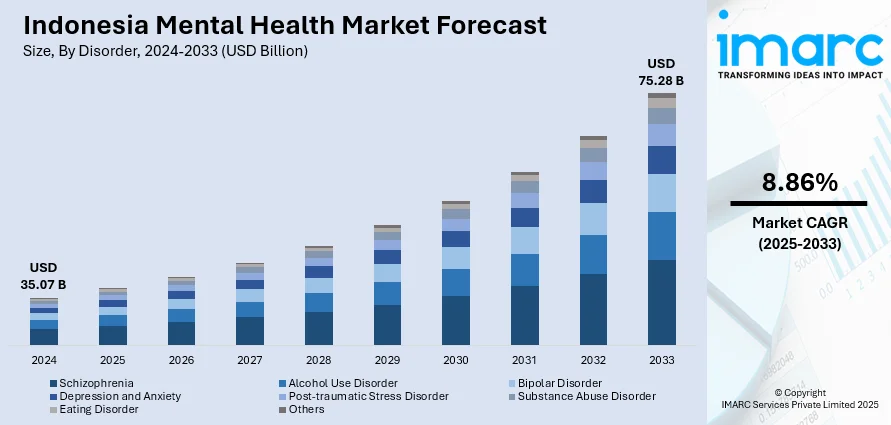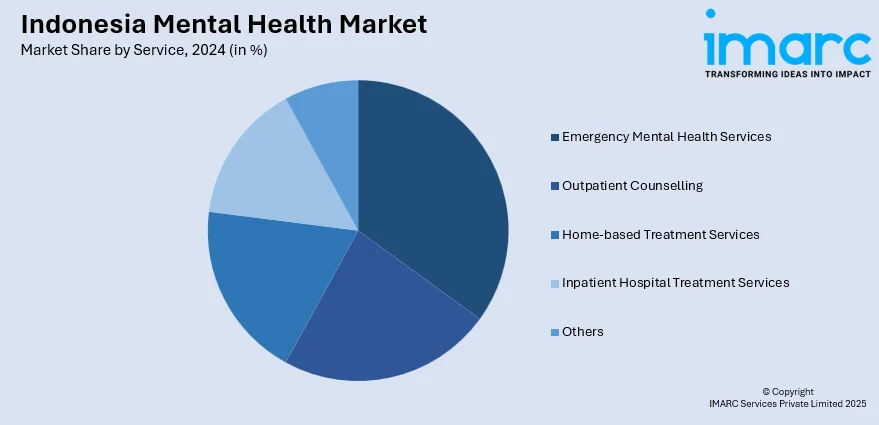
Indonesia Mental Health Market Size, Share, Trends and Forecast by Disorder, Service, Age Group, and Region, 2025-2033
Indonesia Mental Health Market Overview:
The Indonesia mental health market size reached USD 35.07 Billion in 2024. The market is projected to reach USD 75.28 Billion by 2033, exhibiting a growth rate (CAGR) of 8.86% during 2025-2033. The market is driven by rising digital mental health adoption, fueled by smartphone penetration, post-pandemic demand for remote care, and government-backed initiatives to improve accessibility. Rising corporate investments in employee mental wellness, often in conjunction with regulatory standards, is leading to more expanded service efficiencies across industries. The lessening of stigma and increasing public awareness are further enhancing demand for discreet, tech-enabled approaches, which in turn are augmenting the Indonesia mental health market share.
|
Report Attribute
|
Key Statistics
|
|---|---|
|
Base Year
|
2024 |
|
Forecast Years
|
2025-2033
|
|
Historical Years
|
2019-2024
|
| Market Size in 2024 | USD 35.07 Billion |
| Market Forecast in 2033 | USD 75.28 Billion |
| Market Growth Rate 2025-2033 | 8.86% |
Indonesia Mental Health Market Trends:
Escalating Demand for Digital Mental Health Solutions
The market is experiencing an increase in demand for digital mental health treatment, driven by accelerating awareness and the need for accessible, affordable care. With increasing smartphone penetration and internet use, teletherapy platforms, mental wellness apps, and online counseling services are gaining popularity. In 2025, Indonesia had 356 million mobile connections, surpassing its population, and 96.4% of these connections were already broadband-enabled. The internet population increased to 212 million, representing a penetration rate of 74.6%, and 143 million are currently active users on social media. With the growing use of smartphones, there is an urgent need to leverage digital platforms for easy access to mental health assistance and early intervention programs. Companies have surfaced to provide virtual therapy sessions and self-help tools for anxiety, depression, and stress. The COVID-19 pandemic has accelerated the trend, as lockdowns made it impossible to attend in-person therapy. The Indonesian government and private sector are investing in mental health digital health projects to close the treatment gap and enable individuals in rural and remote areas where mental health is not available to gain access to care. As the stigma associated with negative mental health reduces, more Indonesians are seeking anonymous digital options, which is a key area for growth in the market.

To get more information of this market, Request Sample
Corporate Wellness Programs Expanding Mental Health Support
The growing adoption of corporate wellness programs that include mental health support is also supporting the Indonesia mental health market growth. Indonesia is in the midst of a mental health crisis, with the number of diagnoses, especially schizophrenia (32%) and anxiety disorders (21%), being the most prevalent. Therefore, the government launched SATUSEHAT, a self-diagnosis tool that has gained more than 40,000 users since its introduction. There is also an emerging demand for corporate mental health programs to complement these initiatives by placing emphasis on early detection and wellness at work. Employers are becoming increasingly aware of the importance of mental wellness in terms of productivity and employee retention. There is an increasing trend among businesses, especially in Jakarta and other metropolitan areas, to partner with mental health service providers that offer stress management workshops, counseling services, and employee assistance programs (EAPs). Multinational and local startup firms have already made adjustments and added mental health benefits to incorporate into their human resource policies in order to improve their talent acquisition and retention efforts. Additionally, the Indonesian Ministry of Health has emphasized the importance of workplace mental health through a national policy. This was even part of a larger, global trend/design towards highlighting workplace mental health, and corporate wellness is just one of several emerging growth areas for mental health within the context of Indonesia.
Indonesia Mental Health Market Segmentation:
IMARC Group provides an analysis of the key trends in each segment of the market, along with forecasts at the country and regional levels for 2025-2033. Our report has categorized the market based on disorder, service, and age group.
Disorder Insights:
- Schizophrenia
- Alcohol Use Disorder
- Bipolar Disorder
- Depression and Anxiety
- Post-traumatic Stress Disorder
- Substance Abuse Disorder
- Eating Disorder
- Others
The report has provided a detailed breakup and analysis of the market based on the disorder. This includes schizophrenia, alcohol use disorder, bipolar disorder, depression and anxiety, post-traumatic stress disorder, substance abuse disorder, eating disorder, and others.
Service Insights:

- Emergency Mental Health Services
- Outpatient Counselling
- Home-based Treatment Services
- Inpatient Hospital Treatment Services
- Others
A detailed breakup and analysis of the market based on the service have also been provided in the report. This includes emergency mental health services, outpatient counselling, home-based treatment services, inpatient hospital treatment services, and others.
Age Group Insights:
- Pediatric
- Adult
- Geriatric
The report has provided a detailed breakup and analysis of the market based on the age group. This includes pediatric, adult, and geriatric.
Regional Insights:
- Java
- Sumatra
- Kalimantan
- Sulawesi
- Others
The report has also provided a comprehensive analysis of all the major regional markets, which include Java, Sumatra, Kalimantan, Sulawesi, and others.
Competitive Landscape:
The market research report has also provided a comprehensive analysis of the competitive landscape. Competitive analysis such as market structure, key player positioning, top winning strategies, competitive dashboard, and company evaluation quadrant has been covered in the report. Also, detailed profiles of all major companies have been provided.
Indonesia Mental Health Market News:
- February 03, 2025: Indonesia announced that it would conduct a mental health screening program focusing on a broad population of 280 million individuals across 10,000 health centers and 15,000 clinics nationwide. One in ten Indonesians has mental health problems, and this program came specifically in response to the ever-growing problems with mental health in Indonesia, especially among their youth, where 34.9% have indicated they have mental health problems. As alarming as these statistics are, only 2.6% of the affected youth have received any support thus far, underscoring a clear need for this type of intervention.
Indonesia Mental Health Market Report Coverage:
| Report Features | Details |
|---|---|
| Base Year of the Analysis | 2024 |
| Historical Period | 2019-2024 |
| Forecast Period | 2025-2033 |
| Units | Billion USD |
| Scope of the Report |
Exploration of Historical Trends and Market Outlook, Industry Catalysts and Challenges, Segment-Wise Historical and Future Market Assessment:
|
| Disorders Covered | Schizophrenia, Alcohol Use Disorder, Bipolar Disorder, Depression and Anxiety, Post-traumatic Stress Disorder, Substance Abuse Disorder, Eating Disorder, Others |
| Services Covered | Emergency Mental Health Services, Outpatient Counselling, Home-based Treatment Services, Inpatient Hospital Treatment Services, Others |
| Age Groups Covered | Pediatric, Adult, Geriatric |
| Regions Covered | Java, Sumatra, Kalimantan, Sulawesi, Others |
| Customization Scope | 10% Free Customization |
| Post-Sale Analyst Support | 10-12 Weeks |
| Delivery Format | PDF and Excel through Email (We can also provide the editable version of the report in PPT/Word format on special request) |
Key Questions Answered in This Report:
- How has the Indonesia mental health market performed so far and how will it perform in the coming years?
- What is the breakup of the Indonesia mental health market on the basis of disorder?
- What is the breakup of the Indonesia mental health market on the basis of service?
- What is the breakup of the Indonesia mental health market on the basis of age group?
- What is the breakup of the Indonesia mental health market on the basis of region?
- What are the various stages in the value chain of the Indonesia mental health market?
- What are the key driving factors and challenges in the Indonesia mental health market?
- What is the structure of the Indonesia mental health market and who are the key players?
- What is the degree of competition in the Indonesia mental health market?
Key Benefits for Stakeholders:
- IMARC’s industry report offers a comprehensive quantitative analysis of various market segments, historical and current market trends, market forecasts, and dynamics of the Indonesia mental health market from 2019-2033.
- The research report provides the latest information on the market drivers, challenges, and opportunities in the Indonesia mental health market.
- Porter's five forces analysis assist stakeholders in assessing the impact of new entrants, competitive rivalry, supplier power, buyer power, and the threat of substitution. It helps stakeholders to analyze the level of competition within the Indonesia mental health industry and its attractiveness.
- Competitive landscape allows stakeholders to understand their competitive environment and provides an insight into the current positions of key players in the market.
Need more help?
- Speak to our experienced analysts for insights on the current market scenarios.
- Include additional segments and countries to customize the report as per your requirement.
- Gain an unparalleled competitive advantage in your domain by understanding how to utilize the report and positively impacting your operations and revenue.
- For further assistance, please connect with our analysts.
 Request Customization
Request Customization
 Speak to an Analyst
Speak to an Analyst
 Request Brochure
Request Brochure
 Inquire Before Buying
Inquire Before Buying




.webp)




.webp)












